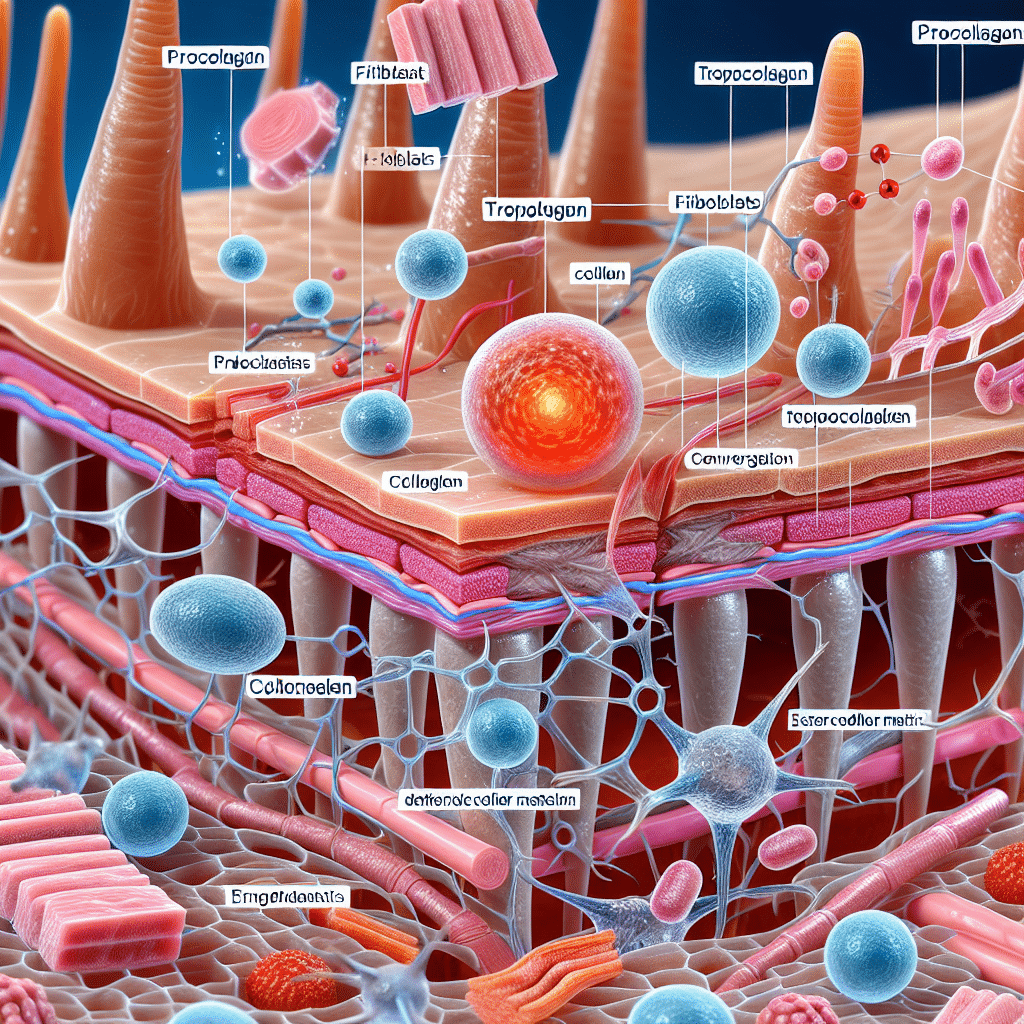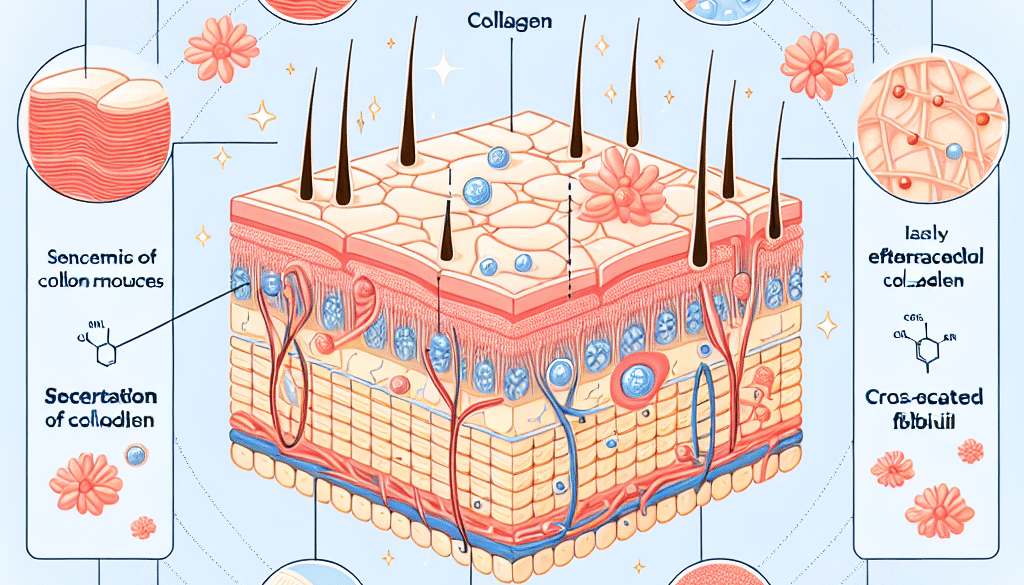Collagen Deposition: Understanding Skin’s Building Blocks
-
Table of Contents
- Collagen Deposition: The Foundation of Healthy Skin
- The Role of Collagen in Skin Health
- Types of Collagen in the Skin
- Collagen Synthesis and Deposition
- Stages of Collagen Deposition
- Factors Affecting Collagen Deposition
- Aging and Collagen
- Environmental Factors
- Nutrition and Lifestyle
- Enhancing Collagen Deposition
- Topical Treatments
- Dietary Supplements
- Medical Treatments
- Case Studies and Statistics
- Conclusion: The Importance of Collagen Deposition
- ETChem: Your Partner for Premium Collagen Products
Collagen Deposition: The Foundation of Healthy Skin

Collagen is the most abundant protein in the human body and a critical component of the skin’s structure. It provides the skin with strength, elasticity, and resilience. Understanding how collagen is deposited and how it functions within the skin is essential for anyone interested in skincare, anti-aging treatments, and overall skin health. This article delves into the intricacies of collagen deposition, its importance, and how it can be influenced by various factors.
The Role of Collagen in Skin Health
Collagen is a key building block of the skin, making up about 75-80% of its dry weight. It forms a fibrous network in the dermis, the middle layer of the skin, which supports the skin’s outer layer and provides a foundation for growth and repair. The quality and quantity of collagen in the skin significantly affect its appearance and function.
Types of Collagen in the Skin
- Type I Collagen: The most prevalent type in the skin, providing tensile strength.
- Type III Collagen: Often found alongside Type I, it’s important during the early stages of wound healing.
- Type IV and VII Collagen: These types form the basal lamina and anchoring fibrils, contributing to the skin’s structural integrity.
Collagen Synthesis and Deposition
Collagen deposition is a complex process involving multiple steps and cellular players. Fibroblasts, the primary cells in the dermis, are responsible for the synthesis of collagen. The process includes the translation of collagen mRNA to form procollagen, which is then secreted into the extracellular matrix (ECM) and processed into mature collagen fibers.
Stages of Collagen Deposition
- Transcription: The DNA sequence of collagen genes is transcribed into mRNA.
- Translation: Ribosomes read the mRNA to synthesize procollagen chains.
- Post-translational modifications: Procollagen chains undergo hydroxylation and glycosylation.
- Triple helix formation: Three procollagen chains twist into a helical structure.
- Secretion: Procollagen is secreted into the ECM.
- Cleavage: Enzymes cleave the ends of procollagen to form mature collagen.
- Fibril assembly: Collagen molecules assemble into fibrils and fibers.
Factors Affecting Collagen Deposition
Several factors can influence collagen production and deposition in the skin, including aging, environmental factors, nutrition, and lifestyle choices.
Aging and Collagen
As we age, collagen production naturally decreases, leading to thinner skin, the formation of wrinkles, and a loss of elasticity. This is compounded by the fact that the quality of collagen also diminishes with age.
Environmental Factors
Exposure to UV radiation, pollution, and smoking can lead to oxidative stress, which damages collagen fibers and inhibits new collagen synthesis.
Nutrition and Lifestyle
A diet rich in antioxidants, vitamins C and E, and amino acids can support collagen production. Conversely, high sugar consumption can lead to glycation, which weakens collagen fibers.
Enhancing Collagen Deposition
There are several strategies to enhance collagen deposition and improve skin health, ranging from topical treatments to dietary supplements.
Topical Treatments
Retinoids, vitamin C serums, and peptides can stimulate collagen production when applied topically. These ingredients are commonly found in anti-aging skincare products.
Dietary Supplements
Collagen supplements, often derived from bovine, marine, or chicken sources, can provide the amino acids necessary for collagen synthesis. Regular intake of these supplements has been shown to improve skin elasticity and hydration.
Medical Treatments
Laser therapy, micro-needling, and other medical procedures can induce controlled injury to the skin, stimulating collagen production as part of the healing process.
Case Studies and Statistics
Several studies have demonstrated the efficacy of various treatments in boosting collagen deposition. For example, a study published in the Journal of Cosmetic Dermatology found that participants who took a collagen supplement daily for 12 weeks showed significant improvements in skin hydration, elasticity, and roughness.
Conclusion: The Importance of Collagen Deposition
Collagen deposition is a vital process for maintaining skin health and appearance. Understanding the factors that affect collagen production and implementing strategies to enhance it can lead to significant improvements in skin quality. By protecting collagen through a combination of skincare, diet, and lifestyle choices, individuals can maintain youthful and resilient skin for longer.
ETChem: Your Partner for Premium Collagen Products
If you’re looking to incorporate high-quality collagen into your products or personal care routine, ETChem offers an extensive range of collagen solutions. Their products are designed to meet the needs of various industries, ensuring that you have access to the best protein building blocks for your skin health endeavors.
About ETChem:
ETChem, a reputable Chinese Collagen factory manufacturer and supplier, is renowned for producing, stocking, exporting, and delivering the highest quality collagens. They include marine collagen, fish collagen, bovine collagen, chicken collagen, type I collagen, type II collagen and type III collagen etc. Their offerings, characterized by a neutral taste, instant solubility attributes, cater to a diverse range of industries. They serve nutraceutical, pharmaceutical, cosmeceutical, veterinary, as well as food and beverage finished product distributors, traders, and manufacturers across Europe, USA, Canada, Australia, Thailand, Japan, Korea, Brazil, and Chile, among others.
ETChem specialization includes exporting and delivering tailor-made collagen powder and finished collagen nutritional supplements. Their extensive product range covers sectors like Food and Beverage, Sports Nutrition, Weight Management, Dietary Supplements, Health and Wellness Products, ensuring comprehensive solutions to meet all your protein needs.
As a trusted company by leading global food and beverage brands and Fortune 500 companies, ETChem reinforces China’s reputation in the global arena. For more information or to sample their products, please contact them and email karen(at)et-chem.com today.

